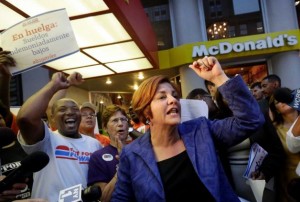Brian Haman, Counterpunch, August 30, 2013 — It has become a truism in American higher education: seventy-five percent of undergraduate courses at U.S. colleges and universities are taught by contingent faculty1, most of whom lack health insurance,2carry onerous student debt,3 receive poverty-level compensation, and often rely on public assistance such as food stamps in order to make ends meet.4 This percentage translates into more than 1.3 million highly-educated, qualified, and competent, but poorly-paid, undervalued, and underappreciated American workers. Conversely, administrative costs at colleges have soared in recent years. The academic managerial class (provosts, vice and associate vice provosts, deans, presidents, vice presidents, etc.) routinely earn six-figure salaries, often with generous perks including vacation homes.5
According to U.S. Education Department data, “U.S. universities employed more than 230,000 administrators in 2009, up 60 percent from 1993, or 10 times the rate of growth of the tenured faculty, those with permanent positions and job security”.6 Most new hires on American campuses never even set foot in the classroom simply because they are not teachers but administrators.7 Furthermore, the cost of a college degree in the U.S. has increased by 1,120 percent since 1978.8 The overwhelming majority of the academic labor force (to say nothing of students, who voluntarily submit to indentured servitude in the form of student debt) suffers disproportionately due to enormous concentrations of wealth in the hands of a small and privileged elite.
We find a similar dynamic in other segments of the American labor force, especially in the fast-food industry. Fast-food workers endure low wages (and indeed wage stagnation), few if any benefits, and a scarcity of full-time contracts.9 The marginalized and contingent workforce at places such as McDonald’s, Wendy’s, and KFC share similar concerns and face similar challenges such as starvation wages, reliance on government assistance, and job insecurity that academic workers endure at some of our nation’s leading universities, including Harvard, Yale, and Michigan.10 However, unlike the academy, the difference between CEO compensation and fast-food workers’ pay is truly breathtaking. David C. Novak, CEO of Yum Brands, which includes chains such as KFC and Pizza Hut, received a total annual compensation of $29.67 million in 2012.11
According to the Wall Street Journal, “Last year, McDonald’s gave [Dan] Thompson a compensation package worth $13.8 million, or more than 558 times what McDonald’s expects employees to make — from two jobs”.12 The national minimum wage in the U.S. is $7.25 per hour and the top five largest employers (McDonald’s is among them) pay its workers at or near the minimum wage. We may reiterate the conclusion of the previous paragraph with one minor revision: The overwhelming majority of the fast-food labor force suffers disproportionately due to enormous concentrations of wealth in the hands of a small and privileged elite.
When faced with such systemic and structural inequalities, how have fast-food workers responded? The answer is quite instructive. They have staged local protests and walkouts in cities across the country and are planning a national walkout in order to fight for a higher minimum wage. As Professor Anne Kalleberg has noted, however, the protests are not union-sponsored but socially organized.13 Fast-food workers, just like their academic counterparts, often struggle to unionize due, at times, to explicit efforts by their employers to prevent them from doing so. Nevertheless, despite such grim circumstances, fast-food workers have pushed their plight quite successfully into the national consciousness just as Occupy movements have done.
Their campaign, entitled “Fast Food Forward”, articulates their purpose with self-assured clarity: “Fast Food Forward joins the momentum of the Black Friday strikes and other low-wage worker struggles to build community engagement, hold corporations and their CEOs accountable, and to raise wages so that all Americans can prosper”.14 Despite its origins in New York City, the movement is gaining momentum; many are now calling for a nationwide strike to take place on 29 August and even President Obama has addressed the issue.
How is all of this relevant for the contingent academic workforce? Well, for one thing, there is strength in numbers. Collective action is an especially effective instrument both to challenge and redress structural inequalities. If, as the aforementioned statistics indicate, seventy-five percent of undergraduate courses at U.S. colleges and universities are taught by adjuncts, then a walkout would bring the academy to a grinding halt. If fast-food workers with fewer career opportunities, less educational attainment, more grueling working conditions (e.g. fast-paced environments, high-temperature workplaces, etc.), and far more to lose can risk their only source of income for themselves and their families for the sake of the collective good, then what is preventing adjuncts from doing the same? The short answer is simple: nothing.
Alas, many adjuncts enable and perpetuate the “system” through their deferential subservience simply by participating in it (recent unionization efforts at Georgetown and elsewhere duly noted). As universities and departments downsize and the numbers of Ph.D. graduates outpace available jobs, many adjuncts accept grossly underpaid positions with long working hours and virtually no benefits with the expectation that a foot in the door will somehow lead to the promised land of a tenure-track position. Supply and demand dictates otherwise and the vast battalions of well-paid academic administrators are more than happy to continue to exploit such naïve and misguided expectations in the name of efficiency.
Surely, too, graduate programs inculcate (and indeed indoctrinate) students in the ways of the academy: publish or perish and do not rock the proverbial boat. On the one hand, academics are expected to challenge scholarly orthodoxies in their respective fields through creative, innovative, interdisciplinary scholarship. And yet in other aspects of their lives, namely those that deal with the contractual conditions under which they labor, they must conform and remain obedient in order to secure employment. It becomes an insidious and corrosive form of selection in which independent thought is filtered out of a system that was designed to protect it. Contradictions become self-evident: the imposition of an authorial canon in the humanities is anathema, whereas wage slavery becomes institutionalized.
Read more: Counterpunch


 Follow
Follow



